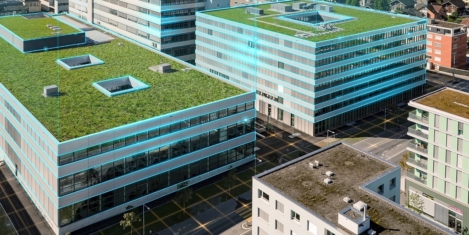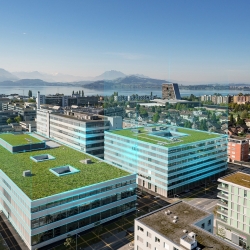To provide the best experiences, we use technologies like cookies to store and/or access device information. Consenting to these technologies will allow us to process data such as browsing behaviour or unique IDs on this site. Not consenting or withdrawing consent, may adversely affect certain features and functions.
The technical storage or access is strictly necessary for the legitimate purpose of enabling the use of a specific service explicitly requested by the subscriber or user, or for the sole purpose of carrying out the transmission of a communication over an electronic communications network.
The technical storage or access is necessary for the legitimate purpose of storing preferences that are not requested by the subscriber or user.
The technical storage or access that is used exclusively for statistical purposes.
The technical storage or access that is used exclusively for anonymous statistical purposes. Without a subpoena, voluntary compliance on the part of your Internet Service Provider, or additional records from a third party, information stored or retrieved for this purpose alone cannot usually be used to identify you.
The technical storage or access is required to create user profiles to send advertising, or to track the user on a website or across several websites for similar marketing purposes.
 As the UK prepares to return to normal in the coming months and industries reopen, research from The Workforce Institute at UKG claims that as a result of the COVID-19 pandemic, 87 percent of UK workers have been propelled into the future of work by accelerating their digital transformation projects. Furthermore, 86 percent are enjoying the benefits of these new technologies, and 38 percent are fearful that their organisation will go back to the “old way” of doing things post-pandemic. (more…)
As the UK prepares to return to normal in the coming months and industries reopen, research from The Workforce Institute at UKG claims that as a result of the COVID-19 pandemic, 87 percent of UK workers have been propelled into the future of work by accelerating their digital transformation projects. Furthermore, 86 percent are enjoying the benefits of these new technologies, and 38 percent are fearful that their organisation will go back to the “old way” of doing things post-pandemic. (more…)







 More than a year after the coronavirus was first reported the UK, the impact on business is undeniable. Research conducted by
More than a year after the coronavirus was first reported the UK, the impact on business is undeniable. Research conducted by 
 Many of us are looking forward to a summer of relative freedom, with road-mapped milestones that will grant us more opportunities to see our friends and family. But we’ll be carrying the effects of months of isolation into those meetings, including a sense that our social skills will need dusting off, and our wits will need sharpening. The mental effects of lockdown have been profound. Social isolation has been shown to cause people’s
Many of us are looking forward to a summer of relative freedom, with road-mapped milestones that will grant us more opportunities to see our friends and family. But we’ll be carrying the effects of months of isolation into those meetings, including a sense that our social skills will need dusting off, and our wits will need sharpening. The mental effects of lockdown have been profound. Social isolation has been shown to cause people’s 
 In those heady pre-lockdown days, the most common complaint about office life, and especially open plan office life, was the inability to get work done without distraction. Now a new paper from researchers at the University of Illinois suggests that the interruptions may have served some purpose in the way they helped people feel a sense of belonging in the workplace.
In those heady pre-lockdown days, the most common complaint about office life, and especially open plan office life, was the inability to get work done without distraction. Now a new paper from researchers at the University of Illinois suggests that the interruptions may have served some purpose in the way they helped people feel a sense of belonging in the workplace. 
 A new survey of many of the world’s leading real estate investors finds that 92 percent of respondents expect demand for healthy buildings to grow in the next three years. The report claims that this is a compelling signal of the direction the real estate sector is heading. This finding, among others, is captured in a report titled
A new survey of many of the world’s leading real estate investors finds that 92 percent of respondents expect demand for healthy buildings to grow in the next three years. The report claims that this is a compelling signal of the direction the real estate sector is heading. This finding, among others, is captured in a report titled 


 Most businesses were ill-prepared to deal with the pandemic and muddled though the challenges stemming from it, according to new report
Most businesses were ill-prepared to deal with the pandemic and muddled though the challenges stemming from it, according to new report 
 The UK government has had to make many changes to its healthcare system in the last year to stop the spread of coronavirus, including asking people to stay home when possible, prioritising higher-risk patients and putting many routine appointments on pause throughout the pandemic.
The UK government has had to make many changes to its healthcare system in the last year to stop the spread of coronavirus, including asking people to stay home when possible, prioritising higher-risk patients and putting many routine appointments on pause throughout the pandemic. 
 As the world emerges from the grip of the pandemic, the
As the world emerges from the grip of the pandemic, the 
 Remote workers are still struggling with distracting working environments, stress and an ‘always-on’ culture after a year of working from home. Egress’
Remote workers are still struggling with distracting working environments, stress and an ‘always-on’ culture after a year of working from home. Egress’ 
 Research by VINCI Facilities claims that the UK facilities management sector does not possess a thorough, detailed strategic approach to combatting climate change. In the autumn of 2020
Research by VINCI Facilities claims that the UK facilities management sector does not possess a thorough, detailed strategic approach to combatting climate change. In the autumn of 2020 








April 1, 2021
Finding a new sense of purpose in the way we all do business
by David Lineen • Comment, Environment, Property, Wellbeing